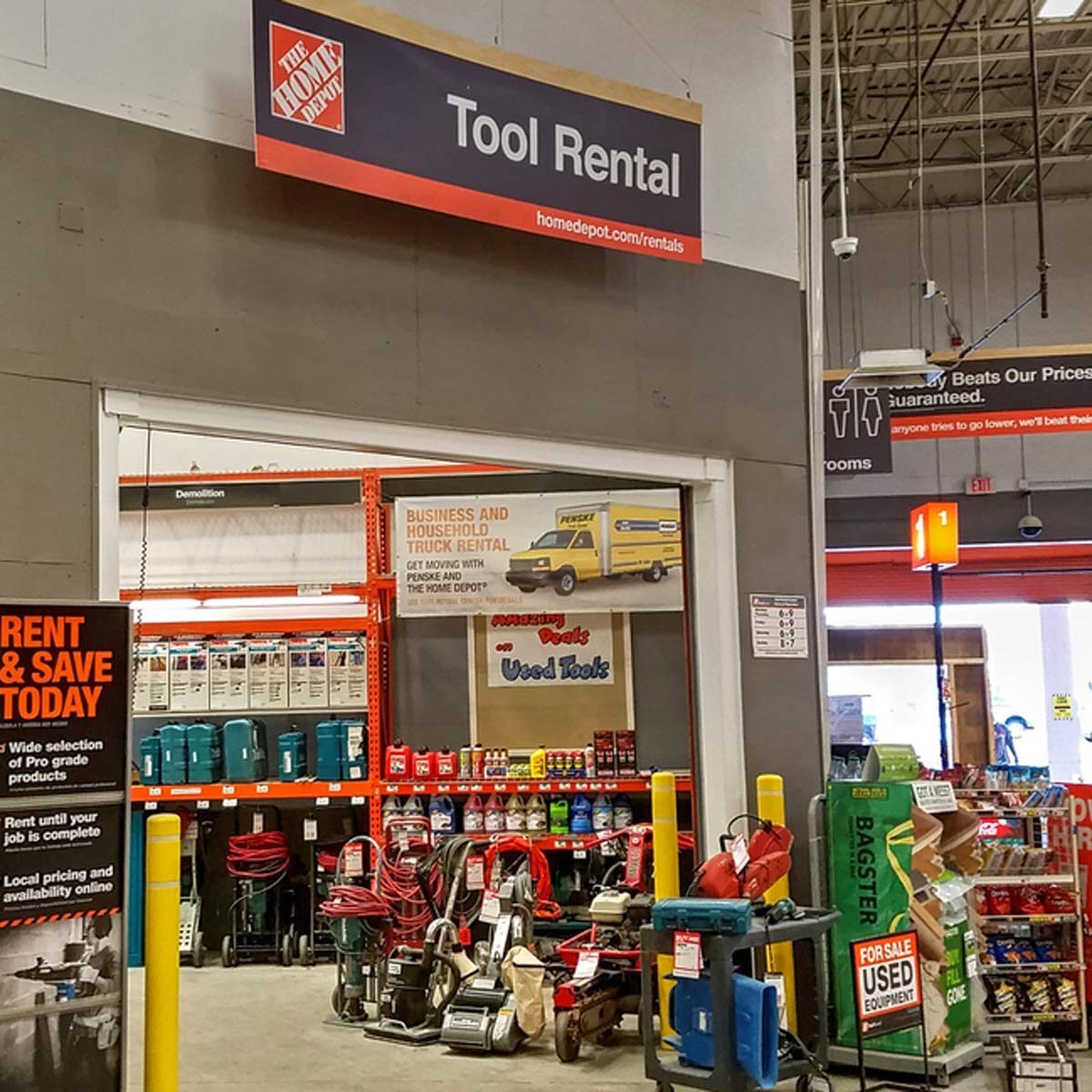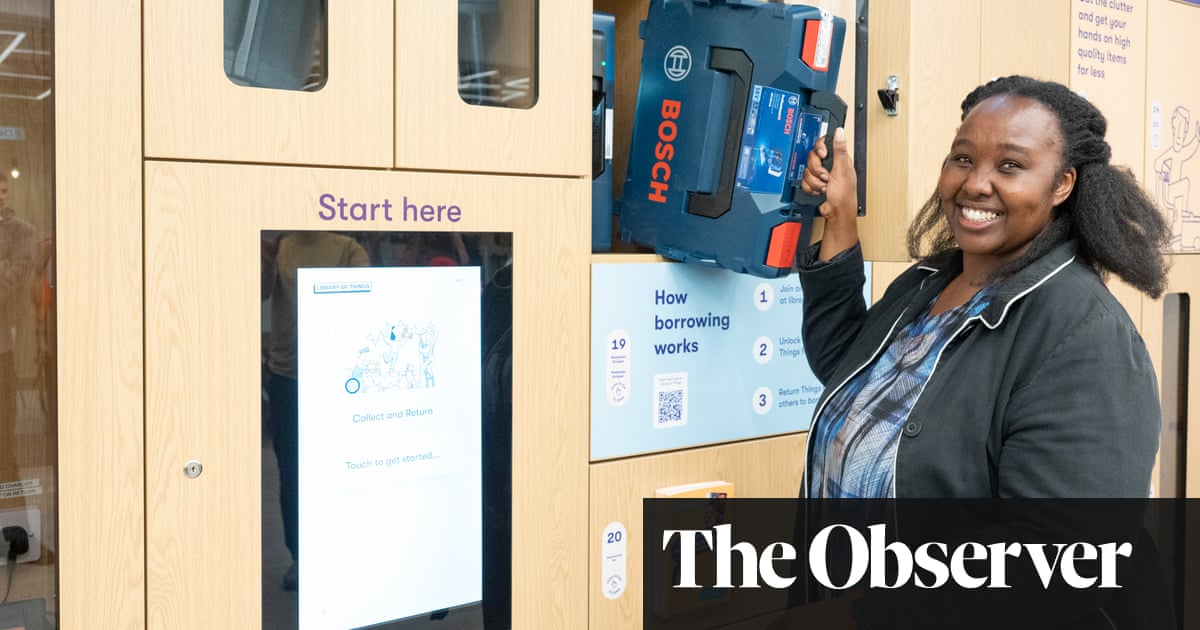The theory is simple: instead of buying a household item or a piece of clothing or some equipment you might use once or twice, you take it out and return it.
With the size of housing units they build in condo buildings these days, who the fuck has any room to store appliances?
Plus, we live in an era where we produce too much shit anyway and it’s damaging the environment. So by sharing stuff like this, it means we need to produce less.
Indeed, also it’s much nicer to use a shared high quality tool than to buy an el-cheapo disposable tool.
Even something simple like a crowbar. I once borrowed a (shorter) professional crowbar after struggling with a (larger) cheap one. The thing I was trying to pry came out like butter.
Even though physics dictates that a shorter lever should be inferior, it just had a much better design and grip.
Better for our wallet, sanity and environment.
Yeah but was it any good for killing head crabs?
This is an outstanding idea for an apartment community. It addresses space issues, cost concerns, and largely prevents abuse from the get-go because you know where all your borrowers live.
In great Montreal area it’s more and more enormous, condo 1000sqft+, thousands of them, that people cannot buy because they are too expensive, I don’t understand the system
Yeah they built these big ass luxury condo towers downtown and most of them are empty. I know because I can see in them from my office building.
Some argue this allows richer people to move out of smaller units therefore freeing them for others. But instead you have international investors coming in to buy them up as a real tax haven. Or the rich will simply buy them but keep the old ones and rent them at a premium. It doesn’t help at all.
You don’t have a tax for owning “abandoned” housing (inhabited by noone)? There should be.
There’s a tax for foreign ownership now,I think…
*cough* Maestria *cough*
This sounds neat until it’s run for profit.
There is a business in my town. There’s probably one like it in your town. They rent power equipment. Anything from pressure washers to bobcats to bouncy castles. And as a man who has needed to drill precisely 8 holes into a concrete slab in 37 years, there is a genuine value proposition in renting a hammer drill for an afternoon compared to buying one.
This week’s rental for me:
- hammer chisel, 24h, about $70 canadian.
- E20 excavator, 8h runtime but over the weekend, around $500 with delivery and fuel
Not going to buy those things or pay someone to operate them. It’s a good deal.
We’ve got this & a local option!

Rentals seem extremely expensive in my area. $100/day for a shitty 4" wood chipper, $300/day for 6" chipper. For some tools, it’s often about the same price or cheaper to buy a tool from Harbor Freight than to rent.
same price or cheaper
Ah, but is it? A quick search shows wood chippers ranging from $400 to $2400. If they’re renting out the $400 model, yeah, you come out ahead by buying even if you’re only chipping things on two weekends (and you could resell on craigslist or something).
But if they’re renting out a $2000 model, I’m not sure how fair it is to compare to the $400 model (I’m not a wood chipper expert).
Wood chippers might be a bad example. I’d think if you need one, you need one multiple times – chipping branches every fall at a cabin, things like that.
But overall, yeah, you make a good point that the rental prices can change the tipping point in rent vs. buy.
Sorry, I was unclear. Chippers are not the tools I was thinking of that would be cheaper to buy (a low quality version of) than rent. Was thinking more about stuff like torque wrenches and rotary hammers. Chipper rental prices were just one thing I was looking at recently that seemed way out of line with what other people from other regions were paying.
Ha, fair enough. Yeah, a quick search shows low-end torque wrenches available for like $25. It’s hard to see a rental making sense at that scale.
How would that ruin it?
Modest profit isn’t an issue, but most businesses of more than a certain size accumulate MBAs like some kind of parasitic fungus. They then proceed to wring out as much money as possible in the short term while destroying the business in the long term.
If it’s just a local guy making 5% or so a year off his one rental shop, that’s no problem.
Yeah pretty much. There are behaviors that are profitable but not good for the community.
In a purely profit business, you price things based on how much people are willing to pay for them.
That translates into things never being priced as being “worth it”, but almost worth it, and definitely not worth it for people with tighter budget
There’s a local store that rents outdoors gear (climbing stuff, camping supplies etc), it’s for profit and it’s great. Would be way cooler if it were a library, but the local business is totally affordable and easy.
I’ve used it several times. My friends and I plan an outing and plan supply pickup/dropoff as part of the outing.
So, the key is to run your business for loss. Wait, that’s called a charity, not a business. How is this thing supposed to work?
Libraries don’t make a profit, AFAIK. Non-profits and co-ops are things too.
That’s true. If something doesn’t directly make money, it can still exist because of taxes or another arrangement like that.
Wait is this trying to suggest just renting is the same thing as a library?
The benifit of a library is you share the cost as a group and get some fractional use of it. Like books that you only really need access to for small amount of time.
Its not the same as say Amazon owning the book rental space and choosing, without any choice on your point, on what books are there or who could get access to them.
Tool libraries are libraries, not rentals.
So no, they aren’t saying renting is the same thing as a library. They are saying libraries offering more services are a great way for you to save money by not buying a tool you only need once or for a day here and there over the years.
I agree with the first part, but they are using the terms interchangeable of renting and borrowing. Talking about renting and subscription in the same vain as borrowing.
I just don’t want the very cool idea of a library economy to be conflated with the “you own nothing” subscription/rent everything economy.
They both have similarities but the actual ownership matters IMHO or else you get rent seeking/enshittification.
That’s fair, I’d agree the article does a terrible job of differentiating, and a company calling itself a library in it’s name doesn’t make it a library, just a rental service playing pretend for profit.
Growing up, there was an association in my area for common ownership of different types of machinery and other equipment for its members. You paid something like $10 a year, and for that you got to borrow all kinds of things you might need as a home owner, like a wood chopper/splitter, high pressure washer, trailers, leaf blowers, cement mixer, scaffolding etc.
I always thought that was brilliant.
Everything as subscription.
Yeah it is seem to be cheap now, until you become dependent on it.
On the flip side, when you lost your job, cancel your home subscription and become homeless.
Oh, I assumed this article was going to be about public libraries. Often public libraries will have things for checkout, like gardening or cooking equipment. Yeah, this is somewhat distopian. These companies will probably make bank off of this. It should be public. We need a larger library system for much more things.
Not sure I agree that it’s dystopian. Imagine how much less waste there would be. People with less crowded storage/garages/houses with less junk they use rarely. Like, I have this scroll saw I’ve used for like one project. Why the fuck do I own this thing?
Reduce. Reuse. Recycle.
I guess so, but I just see this going in the direction of not wining anything and needing a subscription service. They end up costing a lot more and nearly killing off alternatives.
I remember when corner stores rented DVDs, this could be another business for them. But…since they haven’t adopted it I guess it really isn’t that profitable. Power tool prices have come down in price and size.
We need a larger library system for much more things.
Private Equity goes REEEEEE!

Ubik was right
What could go wrong with depending on such a service? The things up for rental here are only things that have to be frequently changed or used just once or twice. I don’t expect to subscribe to more permanent things as part of the expansion of tool rentals. Yes, some like Adobe have already adopted subscription for permanenty things, but that’s different from this topic.
deleted by creator
Here is an alternative Piped link(s):
https://piped.video/gMt-Opo1Ovw?si=kUUwG4InmnP0UkL4
Piped is a privacy-respecting open-source alternative frontend to YouTube.
I’m open-source; check me out at GitHub.
“You will own nothing and like it”
I’m so down for this for items that I don’t need indefinitely. It reduces waste.
It also allows people to use much higher quality products. She’s pulling a power tool out in the picture and goddamn, there’s some garbage tools out there, even from quality brands. Renting a $1000 tool sounds better than buying a $100 tool and encouraging the race to the bottom.
Yeah, that’s how libraries work.
Libraries don’t cost.
My library has a power tools wing. Also a seasonal seeds section. They have gotten very fancy.
Wait for real? Free seeds? That’s rad!
Definitely. A couple of the librarians have been like family friends for I don’t know how long anymore, and they keep adding new programs. I keep hearing from them how things are not great at our library (things aren’t great at libraries anywhere I hear), but then they keep spearheading projects like the tool and seed libraries, getting them added, and I can’t help but think our local library is one of the better ones. We don’t have 3d printing but I hope we will soon.
Taxes are a cost.
deleted by creator
You pay for them through taxes.
It’s interesting how individualism and socialism interact with each other, and how a degree of the latter can promote the former.
A friend of mine who lived in Berkeley in the early aughts was a member of her local tool library. I thought it was a brilliant idea. You just had to be live in the community and getting your library card was free.
At one point my roommate needed a drill to complete some home improvement, so I got the drill, committing to be the drill guy the buddy that had a borrow-able power drill.
Curiously, when I moved, I needed to reduce my stuff drastically, so my roommate inherited the drill.
Yeah I borrowed a bunch of hand and power tools from the Oakland public library when I lived there in the 2010s. They also had a shit ton of video games
Hopefully opportunity attracted you elsewhere, re: leaving Oakland?
Housing was too expensive and we wanted to move back east closer to family. Most of our Oakland friends took a similar path between ‘18 and ‘22
too expensive … [people moved elsewhere]
A huge loss, generally speaking. Darn the almighty dollar!
Obligatory Library Socialism Link: https://librarysocialism.org/
In the simplest terms, the right of usufruct means you can use things, but you cannot deny them to others when you’re not using them, and you do not have the right to destroy them to prevent others from using them. So, for example, the farmer is welcome to grow crops on a given plot of land - but if they choose not to, somebody else can use the land.
Given this, it’s easy to see that this principle already exists in public libraries. You can borrow a book to help you start a business, but you can’t prevent others from reading it after you - or threaten to destroy the book unless you receive the profits of the next reader’s business. You can hold the book exclusively (of other library patrons), but only temporarily.
It’s nice however let’s assume that it is the main consumer model. Then everything becomes possibly 20 times more expensive as companies need to keep same profit (shareholders) and now 20 people pool money to share the thing. It’s not a solution to capitalism, however it would work wonders for environment.
Yet it is us doing all the work for the environment while companies don’t lift a finger and get all the profit. Not a viable long term solution to a fundamental problem of wealth.
It’s not a solution by itself, but a library economy can form part of it: https://www.youtube.com/watch?v=NOYa3YzVtyk
Here is an alternative Piped link(s):
https://www.piped.video/watch?v=NOYa3YzVtyk
Piped is a privacy-respecting open-source alternative frontend to YouTube.
I’m open-source; check me out at GitHub.
Here is an alternative Piped link(s):
https://www.piped.video/watch?v=NOYa3YzVtyk
Piped is a privacy-respecting open-source alternative frontend to YouTube.
I’m open-source; check me out at GitHub.
What the fuck is this rent-a-center propaganda?
How stupid are we?
Pretty dumb. I thought this would be about lending libraries -_-
Tf are both you talking about. The article talks about Tool Libraries and The Library of Thing at length. It name drops a few subscription services for reused baby clothes and kids toys but those are still temporary items people need.
Rent-a-centers core business model consists of predatory loans for household appliances that you need continuously. This article talks about rentals for things you only need for a short period of time.
Subscriptions are just as predatory. I won’t applaud them.
There is a tool library near me and it is $45/yr. It’s amazing. These are really good services and this comment section has no idea what it’s talking about.
Hmm. It sounds to me you just don’t want to acknowledge when you’re being taken for a ride.
But hey, to each their own.
Businesses want a lifeline to our wallets, which is why subscriptions and renting are pushed on useful idiots.
I feel like digital software subscriptions have stigmatized subscriptions in general. Subscriptions are great for things that require constant investment to be meaningful. One subscribes to news and receive constant reporting on the latest news; one subscribes to a tool library and get access to nearly every tool one can need. Plus a large part of the article is about non-profit libraries anyway.
The problem is that you’re renting access to something you’re not actually consuming.
Once you stop paying, you lose access and have nothing to show for it. They still have your money, though.
This is different than, say, paying for electricity which is consumed and no longer available for either party after consumption.
Sorry bud, you’re defending being scammed.
Plus a large part of the article is about non-profit libraries anyway.
Nice talking point just to cover your bum from shilling.
“We can share books if you pay me to maintain the book sharing system via a non optional tax.” Universally loved system.
“We can share tools if you pay me to maintain those tools via a non optional tax.” A niche program most libraries have.
“We can share tools if you pay me to maintain those tools via an subscription where I have a profit incentive.” Literally 1984 and late stage capitalism.
Yep.
They can be, sure, but they can also be a really good deal. If I know I’ll need a certain amount of something on a fixed schedule, I can subscribe to it and save money. This helps reduce costs for suppliers because they have a better idea of how much stock they need on hand, so they’ll want to encourage you to subscribe with discounts.
Subscriptions are bad when there’s some form of lock-in, such as a fee for breaking the subscription, or if the cost is arbitrarily high without the subscription because of a lack of competition. I dislike digital subscriptions in general because of this, since you’ll lose access to all of the content you’ve enjoyed to that point.
But subscriptions to consumables are fine by me.
Stupid enough to wake up in this world. It didn’t happen in one day.
When I was a kid in the late 80s/early 90s, we had a toy-library across from our house. You could rent all kinds of toys for a week, extend if needed, and return it when the kids got bored with it. Good times.
They also had LEGO, and every piece had to be accounted for on return.
They went out of business when people started buying their own GameBoys and PlayStations.
My public library had toys for rent when I was a kid. You could check out Teddy Ruskpin and Power Wheels and full sets of sports equipment to use in the park next door. Then the neighborhood got hit by the late 80s financial crisis and the program was cut. And then they spent an enormous amount of money on a computer lab. And then an Adult Learning Center. And then they decided too many poor people were near the library, making it unsafe, so people stopped bringing their kids there. And then it got defunded. And now its abandoned.
Libraries used to have all sorts of cool high end shit in them. Now they’re so heavily deferred on maintenance that people don’t feel safe working inside.
Real shit.
The USA has been going backwards for some time now. I’m not even some Chinese simp or very political (I made an account on .ml before I even knew what I was doing) but it’s impressive how far they have advanced over the last 20-30 years and how the USA has just stagnated or regressed.
I’m not even some Chinese simp or very political (I made an account on .ml before I even knew what I was doing) but it’s impressive how far they have advanced over the last 20-30 years and how the USA has just stagnated or regressed.
The Chinese had a ton of catching up to do after WW2. So the first major industrializations in nearly a century are going to hit different than what Americans were trying to do at the bleeding economic edge.
But the mismanagement of the American economy has been glaring. Trillions into a series of disastrous wars. A desperate clutching to legacy ICE, long past its expiration date. De-investment in education, in health care, and in mass transit infrastructure. Financialization run amuck, to the point that fictitious speculative assets are outpacing the value of real capital and estates. Stagnant wages. Declining living standards. Police violence from coast to coast that seems to worsen with each new administration.
Now that the US and China are roughly on par technologically, there’s no strong reason for China to continue to outpace the US. Certainly, they’ve come down quite a bit from the heyday of double-digit annual growth figures. And we’ve got ample opportunity for domestic investment in a country that’s needed an infrastructure overhaul since the turn of the 21st century.
But nationalism is like rooting for your local baseball team. It doesn’t matter how bad the Yankees are doing this season. You wave that fucking pennant or you get your ass back to Boston.
We had a rental thing for toys in our old neighbourhood, but you paid for it with currency made from helping at the nearby petting zoo.
We had the same, and it rented video game console and games, it was great.
Renting stuff makes sense, but there are still lots of inherent problems with tool libraries and the like.
They’re great for a carpet shampooer or chainsaw you need once a year, but if you actually want to fix and build stuff around the home then booking a tool, taking perfect measurements, hauling your stuff over to a tool library, building it, hauling everything back home to check it, is simply an infeasibly onerous process. The instant you make a mistake and need a different tool, or check a measurement, etc, you’re wasting hours of time, which is most often the biggest limiter for home projects anyways.
You also don’t get to learn on the same tool and build up instincts and understanding of how it behaves.
I think you ahve a fundamental misunderstanding on how the tool libraries and stuff work…
I’m conflating a tool library and a maker space but the same issues apply to both. Either way, for home projects you end up with a whole lot of extra transportation.
None of this was about a maker space either
Cool beans bro, learn how to read a full comment and you’d see the part where it doesn’t matter since theyre basically the same and have the same drawbacks.
No, conflating them doesn’t make any sense. You bring home the tool from the tool library, and you bring it back when you’re done. It’s one extra trip vs. going to the hardware store to buy the tool. The concerns about mismeasurements and extra trips don’t apply.
You’d have a point if the thread were about maker spaces, I’ll give you that. As it stands, though, I’d say your concerns are misdirected.
You cut the first piece, realize you actually need a different type of saw for the next cut, it’s booked out, now your project is indefinitely delayed.
They are similar because in both cases you are sacrificing resiliency (multiple copies of a resource), for efficiency (a singular shared copy).
A tool library is still a great idea / resource for when you’re doing a project and need one weird tool that youll never use again, but most people who do any real amount of DIY over their lives will want their own set of tools that cover most of the bases.
Counterpoint: You go to the store to buy the saw you think you’ll need, come home, cut the first piece – boom, same realization. Same time-sink to go back to the store. I don’t think that’s a concern unique to tool libs.
need one weird tool
Well, yeah. We’re talking more expensive things that you only need for one project, or maybe a couple of times. Not the screwdriver set that you use for everything from box-cutting to adjusting the screws on your cabinet doors when they seem wonky.
I don’t see how going to the library is such a big hurdle? The closest library to me is less than ten minutes drive, and on the way to a lot of stuff. I don’t know this seems like a kind of insane objection. If you’re poor, it’s not like you’re just gonna spend $200 on a new tool anyway because you can’t. In my experience I’m more likely to just try to make do with the crappy alternative I have available.
This take just seems really privileged. The biggest barrier for a lot of people isn’t the time - it’s affording the tools in the first place.
I mean if you’re trying to learn to be a competent handyman or build a bookcase maybe yeah, but I just need a screwdriver set for like 30 minutes to put something together.
Now a multi screwdriver is something you can buy.
You had it, then you lost it. It’s for those things you need only once a year or two years or never again.
Libraries of things should be state run and free at point of use. They should also be integrated into communities in a way that makes them easy to access. Instead of everyone having a lawn mower, you check out an electric mower once a week, on a date that you’ve reserved it, and the entire community uses it, or if in a large community, your immediate neighbors use it, and then it’s returned for the next people to use it.
Libraries of things should not only be for things you use once a year. They should be for just about everything that you don’t use every day.
Usafruct >>>>>> UsusFructisAbusus.
Not sure if dystopia
It’s dystopic if most can only afford to rent what they always need. IMO being able to rent something you rarely need is a good thing.
I’d much rather have my car for day to day driving and rent something with more space the few times I need to move something that won’t fit in my car. Even better would be to have ride share programs to use for medium loads and reliable mass transit for trips where I don’t have much to move.
it’s not dystopic in the sense that companies are selling tools to people who don’t need tools for an extremely prolonged time.
That would be fucking dystopic, being forced to buy tools you don’t need, because it’s the only option to get them.
Even better would be that Arcimoto MUV thing. Sadly it appears they went bankrupt

Cool
Looks a lot like a BMW prototype I saw almost 20 years ago. I kept hoping they’d bring it to market, but I guess it’s safe to give up on it by now!
They brought it to market for six glorious years but couldn’t achieve mass-production and spent way too much on a ton of SKUs most people don’t want before they basically went bankrupt.
Quite the contrary: it reduces wasteful consumption and reducing consumption is a requirement for Ecological recovery.
I would say that buying for very infrequent use or for a temporary need something which can be used with no problems for much more than that, is wasteful consumption at a systemic level - there should be alternatives.
Sure, owning your own personal high powered professional drill satisfies the greedy animal inside, but it’s not exactly wise of justified for most of us even just at a personal level. Ditto for quite a lot of other things.
The drive to own lots of shit isn’t healthy, both in a personal sense and in a systemic sense (including but not limited to Ecological), though it sure makes a ton of money for those who own most Productive Assets and all the ones is supporting areas such as Money Lenders, that most humans act as Consumers only limited by the maximum indebtness they can get into with their income.
Even if people can afford to own tons of things they barelly use, it would actually be better for everybody if that wasn’t common.
The only dystopia element of this is that in Late Stage Neoliberal Capitalism people are being pushed to rent because of the miniscule and worsening share of the wealth produced that workers get - or in other words, shit salaries whilst investment income has never been this good - as they can’t afford to own anymore, rather than because of a shift in the way people thing and them actually wanting to rent rather than own.
It’s the cracks in dystopia. Good things that would be awesome without dystopia but wouldn’t start without dystopia. Public libraries are a relic of the gilded age dystopia for example
There’s a company in Brentwood Tennessee and online that rents very expensive camera lenses.
So you can borrow a $3000 lens for say $200 for a week.
There is a “tool library” sort of service (for profit) operating in my area. The prices are absurd—people are charging like $20/day for a tool that would cost $100 new, or half that used on craigslist. My projects often span multiple days, especially if there’s an unforeseen delay—which there always is because I’m a good engineer but a shitty carpenter.
I don’t use the service. I’m all for communal ownership but it still has to make sense.
There is a “tool library” sort of service (for profit)
Wait I am confused
library
Alright got it.
(for profit)
What
Ok….Why is everybody using the world “library” like it is an even remotely compatible concept with a for profit rental business??!
Is this just capitalism trying to purposefully destroy any meaning behind the word “library”?.
If your service is to rent tools out to places you are a tool rental company not a “tool library”. You would be a tool library if you were a community governed non-profit that let people borrow tools for essentially no money.
sigh it makes me so cynical how clearly libraries would never have been allowed to exist in a time as nauseatingly conservative and capitalist as this if they weren’t already old and boring concepts, the media, corporations, centrist democrats and republicans would all lose their mind about libraries being too radical of a concept if a leftist proposed them as an idea now.
:(
It’s a for-profit service that people use to rent-out, and rent-in their tools. Not a true library so to speak but seeks to accomplish the same. Except that people charging $20/day to rent their battery-powered Ryobi drill is absurd.
It’s a for-profit service that people use to rent-out, and rent-in their tools
So yes this is the same old shit as labeling Uber or Lyft a “ridesharing app” instead of calling it what it is, a taxi service.
The correct name for this type of entity would be a consignment & rental store.
This kind of thing has NOTHING to do with libraries whatsoever in structure but more importantly in intended function and community impact.
Agreed.
Note that the featured rate in the article is “Another rented a planer at £11 a day to fix two doors in her flat after being quoted £245 for a handyman to come in and do the three hour job”.
It’s not a fair comparison then is it? $80/hr is an expensive but not outrageously so handyman, plus they have their own tools to purchase and maintain and other business operating overhead (fuel and transportation maintenance) etc.
DIY—if you’re able—is always less expensive.
quoted £245 for a handyman to come in and do the three hour job
Power tools, hand tools, clothes, batteries, heavy painters cothes, gloves etc… do not make the job.
The skill of the handyman who can quickly and efficiently deduce an effective solution (described vaguely by a couple of photos and a description over the phone by someone who doesn’t know shit about the problem they need solved) to a carpentry/handyman repair and do it within 3 hours is what makes the job.
People often make the point about learning home repair as a way to save money, and true it definitely is a necessary skill to some degree as a home owner unless you have a lotttt of money… but learning to do your own home repair really isn’t “saving money” so much as simultaneously devaluing your free time AND labor time to the point that all of the incurred debt is inscribed into your body and lost time with your family or friends rather than in invoices for repairman. This leaves me hesitant to call doing a significant portion of home renovation yourself ON TOP of holding down a full time job “saving” anything even if it helps keeps monetary expenses down.
Rent-to-Own has always been a scam predicated on people too poor to enjoy a stable life.
Hopefully you have an actually competent and accurately-priced makerspace near.



















